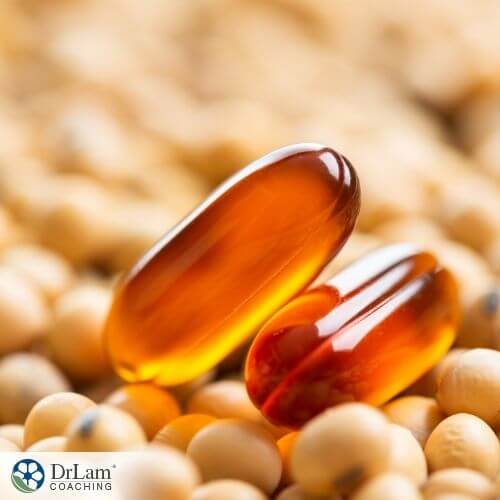As with so many supplements we take in the hopes of helping our bodies operate at their best, not a great deal of research exists regarding lecithin. But there are many anecdotal reports regarding its benefits for several health conditions. This article will enumerate those as well as give information about concerns some professionals express about lecithin.
 Made up of a mix of fatty substances acalled glycerophospholipids, lecithin occurs naturally in the tissues of your body. Moreover, as an emulsifier, it prevents fats and oils from mixing with other substances by keeping them in suspension.
Made up of a mix of fatty substances acalled glycerophospholipids, lecithin occurs naturally in the tissues of your body. Moreover, as an emulsifier, it prevents fats and oils from mixing with other substances by keeping them in suspension.
Choline, an essential nutrient coming from the B-complex family, comes chiefly from the phospholipid phosphatidylcholine, or lecithin. Among its various essential metabolic roles, choline plays a critical role in lipid metabolism, the structure of cell membranes, and acts as a precursor in the production of acetylcholine, a major neurotransmitter.
Lecithin typically comes from sunflower seeds, eggs, or soybeans. One of the biggest crops in the U.S., soy also provides the most common source of lecithin supplements because of its lower cost to produce. However, the vast majority of the soybeans also undergo genetic modification. In addition, the chemicals acetone and hexane, often used to extract lecithin from soybean oil, potentially pose threats to your physical health.
Not as common as the soybean-based product, lecithin produced from sunflower seeds does not go through a process that includes harsh and potentially dangerous chemicals. For this reason, many people prefer this type of product.
Healthcare professionals differ in their opinions regarding lecithin and whether it actually benefits you in the many ways its supporters argue. The benefits listed below come from anecdotal reports primarily.
The most frequently touted benefit of taking lecithin involves its reported ability to lower cholesterol. Research indicates taking soybean lecithin works to help increase HDL cholesterol and lower LDL cholesterol. And this research suggests taking this substance leads to lowered concentrations of cholesterol by increasing biliary secretion. However, other research suggests lecithin could contribute to the formation of a compound associated with atherosclerosis, so caution is advised.
Some research suggests soy-based lecithin can improve your cardiovascular health. This finding comes from a small study involving soy products that included lecithin. In addition, the subjects of the study already suffered from a high risk of developing either heart disease or high blood pressure. However, other research suggests lecithin could contribute to the formation of a compound associated with atherosclerosis. See the caution section below for more info.
As a solution for preventing clogged milk ducts, the Canadian Breastfeeding Foundation suggests a dosage of 1,200 milligrams four times per day. However, this dosage does not help remediate already-clogged milk ducts. But it appears to decrease the viscosity of breast milk, making it less likely to clog the milk ducts.
Research shows lecithin helps improve digestion in people with ulcerative colitis. Its emulsifying properties help build a chain reaction that increases the mucus in your intestines. Therefore, it helps to make digestion easier and helps protect the delicate lining of your intestines. So, if you suffer from a different gastrointestinal disorder than ulcerative colitis, you might consider lecithin as a supplement to help your digestion.
Research shows choline, a chemical your brain uses in communication and found in lecithin, can improve memory function and aid in improving the symptoms of Alzheimer’s. Substances like lecithin that contain choline appear to help improve your brain’s functioning. However, research appears conflicting regarding whether it can work as a remedy for those with neurological and nervous system conditions. But ongoing research shows promise.
Used as an emollient, lecithin helps the skin remain smooth by restoring hydration. As a result, it finds use in many skincare products. Some people use it to cure acne and eczema. However, the research backing up this use remains sparse. Possibly, taking lecithin supplements can improve your skin. But, again, this claim lacks research to back it up.
A small study from Japan indicates lecithin may fight fatigue in middle-aged women. But the study contains several limitations. High doses, up to 1200 mg per day, increased their energy levels.
Animal research indicates soy lecithin can improve immune function in diabetic rats. In this research, daily supplements improved macrophage activity by 29%. These white blood cells work to surround microbes, cancer cells, and debris in your body. In addition, these supplements increased the number of lymphocytes in non-diabetic rats by 92%. However, whether these kinds of increases will occur in humans needs further research.
 As with most supplements, you should be aware of cautions regarding the use of these supplements. However, lecithin is labeled "generally recognized as safe" (GRAS) by the Food and Drug Administration (FDA). Used in reasonable amounts, this supplement should generate few, if any, side effects.
As with most supplements, you should be aware of cautions regarding the use of these supplements. However, lecithin is labeled "generally recognized as safe" (GRAS) by the Food and Drug Administration (FDA). Used in reasonable amounts, this supplement should generate few, if any, side effects.
If you do experience side effects, they may include:
One potential problem associated with lecithin is its possible role in forming trimethylamine n-oxide, or TMAO, a compound that appears involved in the formation of atherosclerotic plaque and is higher in people suffering from kidney failure. More research is needed on this issue, but if you suffer from heart or kidney issues, it may be best to discuss this with your doctor.
More research should take place regarding the use of lecithin by women who are pregnant or breastfeeding.
If you suffer from high cholesterol or a history of heart disease, consult with your healthcare provider before starting supplementation with lecithin.
If you decide to take lecithin supplements, make sure of the ingredients in the supplements if you suffer from allergies to eggs or soy products.
In addition, make sure to know about daily dosage recommendations and do not exceed 5000 mg per day.
And you need to ascertain how much lecithin you actually get in these supplements. Different manufacturers may put differing amounts of the actual substance in their products. In many supplements, fatty acids make up the major portion of the product. If this occurs, it may actually work against the claims for help with liver function, weight loss, or improved cardiovascular health.
The best way to get sufficient lecithin comes through natural food sources, although supplements are available, since the FDA does not monitor supplements for safety or purity. So, be sure to research any supplements you take and the manufacturers of those supplements.
 Foods that contain lecithin include:
Foods that contain lecithin include:
Getting your lecithin from these food sources should lead to no adverse reactions.
If you suffer from AFS, a condition in which chronic stress overwhelms your adrenals to the point of not producing sufficient cortisol to fight the effects of stress, should you use lecithin as a supplement?
In order to answer this question, you must understand the effects of high levels of cortisol on your body and the NeuroEndoMetabolic (NEM) Stress Response. The NEM consists of six inter-related circuits comprised of three organs or systems each that work to help your body deal with stress.
In the beginning stage of adrenal fatigue when stress grows, your adrenals produce and release large amounts of cortisol to fight the stress. Normally, the hormonal circuit of the NEM regulates the amount of cortisol in your system. However, when stress hits and grows, this regulation can become ineffective.
High levels of cortisol may result from your adrenals becoming hyperactive in the face of growing stress. These high levels can lead to a number of disorders, including:
All of these conditions result from the inability of the hormonal circuit to regulate the production and release of cortisol. Once the hormonal circuit becomes dysregulated, the metabolic and neuroaffect circuits become activated to help deal with stress. However, this activation disrupts your thyroid function, mood, and the function of other organs and systems affected by hormones.
The goal then becomes regulating systems in your body so that the circuits in the NEM can begin working in balance once again to help your body function well. One step in doing this involves reducing the level of cortisol circulating through your bloodstream. And taking lecithin supplements may help this. Increasing lecithin tells your brain to protect healthy cells and rid the body of excess cortisol. This allows you to calm down and recover from stress more quickly.

Overall, lecithin supplements appear to be low-risk supplements. However, obtaining sufficient lecithin through food sources continues to be the best option.
Solid research into the use of lecithin remains sparse. However, observational evidence provides a solid foundation for the potential benefits of the supplement.
The major drawback to its use remains the potential for the formation of TMAO and its involvement in the formation of atherosclerotic plaque. Until further research clarifies its role in atherosclerosis, moderation in the use of lecithin is recommended.
Likewise, the use of high levels of lecithin does not appear necessary due to a lack of scientific research supporting this use. The potential for increased risk of heart attack or stroke remains too high for this kind of use at this time.
If you are suffering from conditions that may respond to lecithin supplementation, here are a few things you should consider:
Whatever course of action you decide to take, however, please do so with the guidance of your healthcare professional who can help you look at options and decide on the best one for you.
If you would like to know more about or need assistance with lecithin supplementation, the team at Dr. Lam Coaching can help. We offer a free** no-obligation phone consultation at +1 (626) 571-1234 where we will privately discuss your symptoms and various options. You can also send us a question through our Ask The Doctor system by clicking here.
The short answer to this question is yes and no. Lecithin has a good base of observational evidence to show its effectiveness in dealing with a number of conditions. However, scientific support through research is lacking. In fact, some potential for significant harm has been shown in research. It's always safest to talk to your doctor first.
